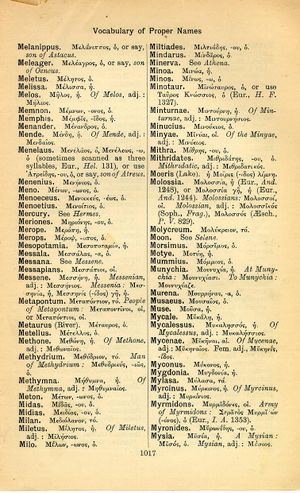Minturnae
καλῶς γέ μου τὸν υἱὸν ὦ Στιλβωνίδη εὑρὼν ἀπιόντ' ἀπὸ γυμνασίου λελουμένον οὐκ ἔκυσας, οὐ προσεῖπας, οὐ προσηγάγου, οὐκ ὠρχιπέδισας, ὢν ἐμοὶ πατρικὸς φίλος → Ah! Is this well done, Stilbonides? You met my son coming from the bath after the gymnasium and you neither spoke to him, nor kissed him, nor took him with you, nor ever once felt his balls. Would anyone call you an old friend of mine?
English > Greek (Woodhouse)
Μιντούρνη, ἡ.
Of Minturnae, adj.: Μιντουρνήσιος.
Latin > English (Lewis & Short)
Minturnae: ārum, f.,
I a city of Latium, on the border of Campania, at the mouth of the Liris, in the neighborhood of which Marius concealed himself from Sylla in a marsh, Plin. 3, 5, 9, § 59; Liv. 9, 25, 3; Vell. 1, 14, 6; Hor. Ep. 1, 5, 5; Val. Max. 2, 10, 6; 8, 2, 2.—Hence,
II Minturnensis, e, adj., of or belonging to Minturnæ: populus, Liv. 27, 38: litterae, written at Minturnæ, Cic. Att. 5, 3, 2: flumen, i. e. the Liris, Dig. 19, 2, 13.—Subst.: Minturnenses, ĭum, m., the inhabitants of Minturnæ, Vell. 2, 19, 2.

